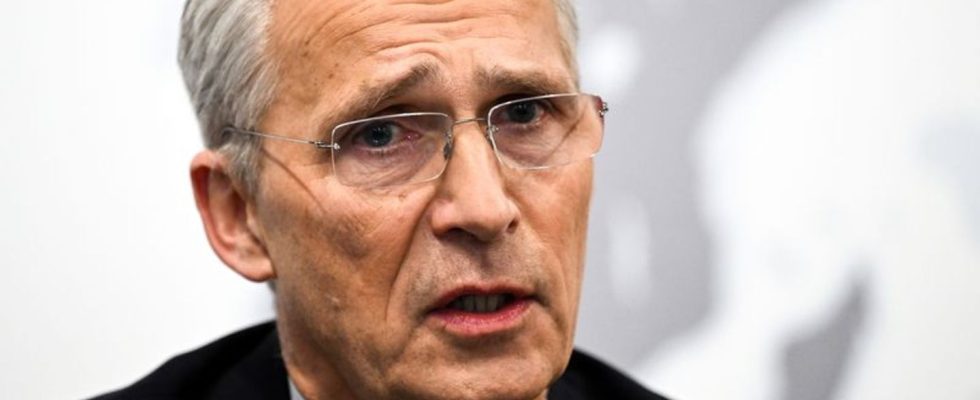Finance
NATO states and the EU: The plan for aid to Ukraine
NATO Secretary General Jens Stoltenberg sees Russia’s war of aggression as failing. photo
© Federico Gambarini/dpa
Is support for Ukraine slowly declining? NATO wants to avoid this impression. The EU is also pushing ahead with aid despite the blockade by Hungarian Prime Minister Viktor Orban.
What was specifically promised remained unclear at first. NATO cited the planned provision of additional air defense systems as an example of aid commitments. “The allies have already provided Ukraine with a variety of air defense systems and today reaffirmed their readiness to further strengthen Ukraine’s defense,” it said.
Allies are currently purchasing up to 1,000 Patriot anti-aircraft missiles through NATO to replenish their stockpiles. Ukraine is also supplied from these.
Criticism of the use of missiles from North Korea
According to NATO, the topic of the meeting at ambassadorial level was arms deliveries from Iran and North Korea to Russia. The allies condemned the escalation of Russian air strikes on Ukraine as well as Russia’s use of ballistic missiles from North Korea and drones from Iran, it said.
Stoltenberg sees failure of Russia
Secretary General Jens Stoltenberg said: “As Moscow increases its attacks on Ukrainian cities and civilians, NATO allies are strengthening Ukraine’s air defenses.” Russian President Vladimir Putin is trying to wear down Ukraine with massive blows for the second year in a row, but he will not succeed. NATO cited the Patriot and Skynex air defense systems recently delivered by Germany as an example of assistance that has already been provided.
The NATO-Ukraine Council last met at foreign minister level in November. The committee was set up last summer at the alliance summit in Lithuania and is intended to enable closer cooperation until the conditions for Ukraine to join NATO are met. These include, among other things, an end to the Russian war of aggression and reforms in Ukraine.
Ukraine asked for a meeting
The government in Kiev had requested the meeting. The main reason for this was the heavy Russian missile attacks over the New Year. Russia attacked Ukraine with a combination of rockets, cruise missiles and combat drones. They were the heaviest air raids to date. According to the government in Warsaw, a Russian missile briefly violated Polish airspace and thus NATO territory.
EU plans initially without Hungary
Despite ongoing resistance from Hungary, the EU is also pushing ahead with preparations for new billions in aid for Ukraine. In Brussels, representatives of the member states decided by majority vote to start negotiations with the European Parliament on the support plans, as several diplomats told the German Press Agency.
The aim is therefore to be able to implement the aid program as quickly as possible after Hungarian Prime Minister Viktor Orban gives in. This also requires the approval of the European Parliament.
Consensus for Ukraine aid program has not yet been reached
Actually, a new Ukraine aid program worth 50 billion euros for the next four years was supposed to have been agreed at the member state level at the EU summit last December. However, a consensus was needed there.
Hungarian Prime Minister Viktor Orban vetoed the decision. He had previously questioned the usefulness of the plans several times and in this context also pointed out that, in his view, the EU had wrongly frozen funds from the Community budget intended for his country.
The further procedure
If no solution is found with Hungary in the coming weeks, the other EU states want to act in a circle of 26 – i.e. without Hungary. A special EU summit on how to proceed has been announced for February 1st. It is hoped in Brussels that Hungary will give up its resistance by then at the latest.
According to diplomats, at the meeting of the permanent representatives of the member states, the Hungarian representative advocated a compromise that would stipulate that the financial aid must be confirmed by the EU member states every year. But many others reject this – among other things because it would give Hungary the opportunity to impose further blockades.
The EU wants to use the financial aid to enable the Ukrainian state to continue paying wages and pensions. In addition, the operation of hospitals, schools and emergency accommodation for resettled people should be guaranteed.
In addition, the money can also be used to restore infrastructure destroyed by the Russian war of aggression. These include power lines, water systems as well as roads and bridges. Last year the EU paid out financial aid worth 18 billion euros.

